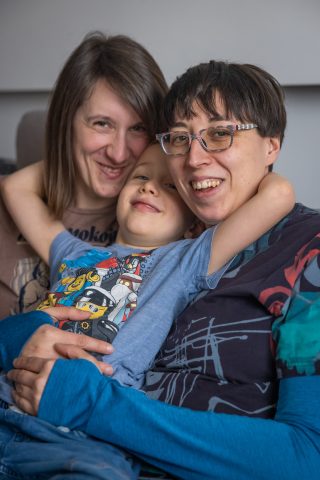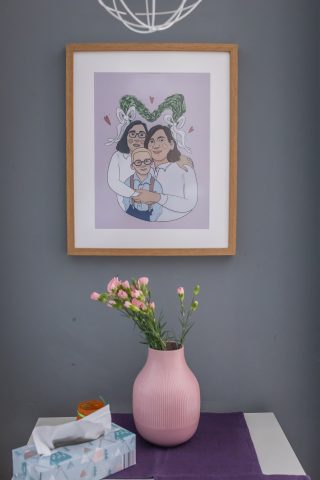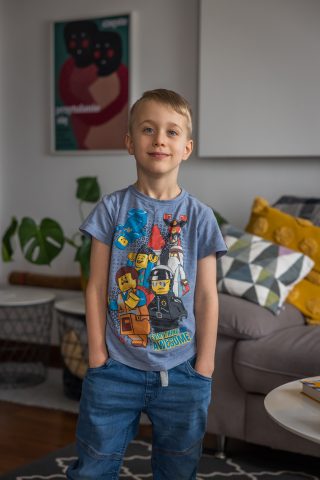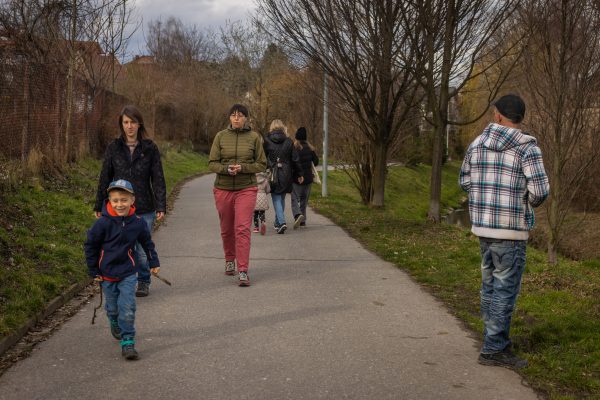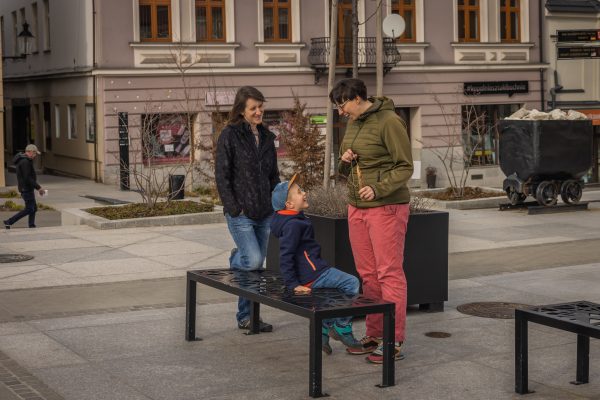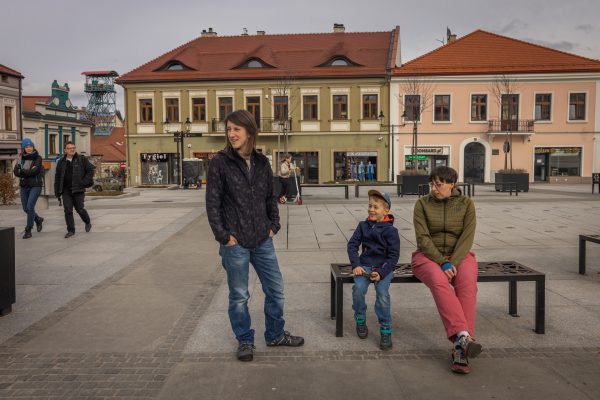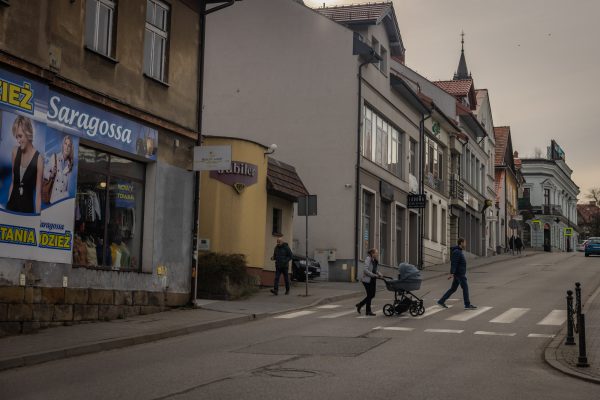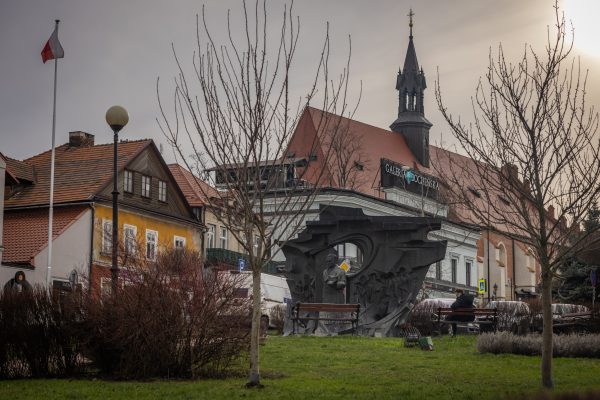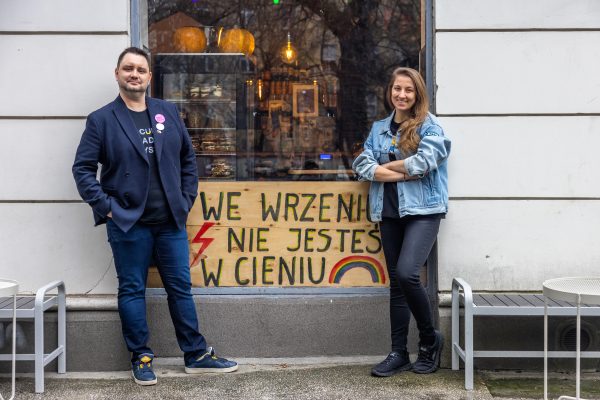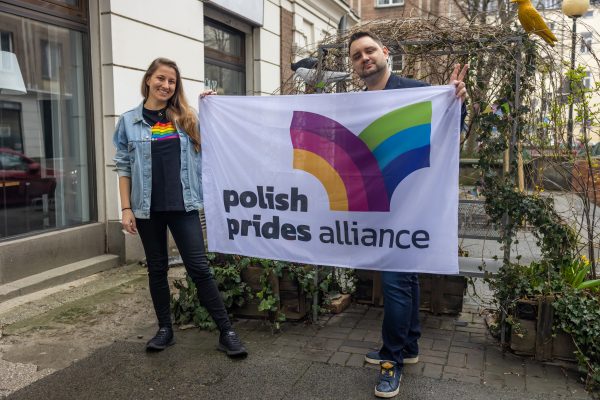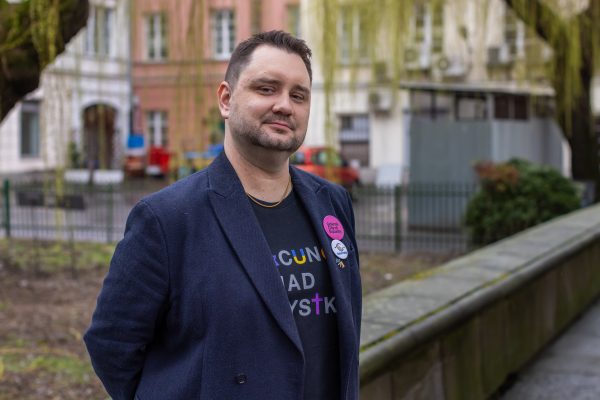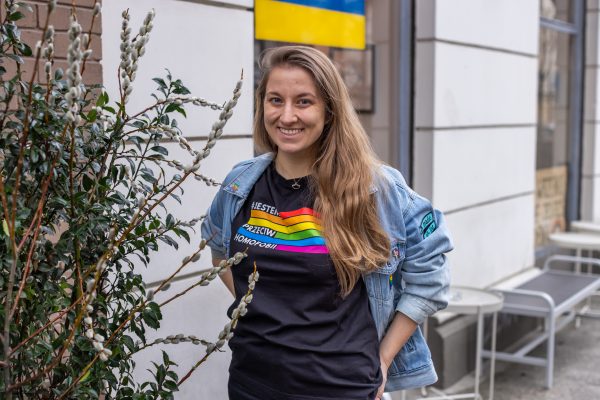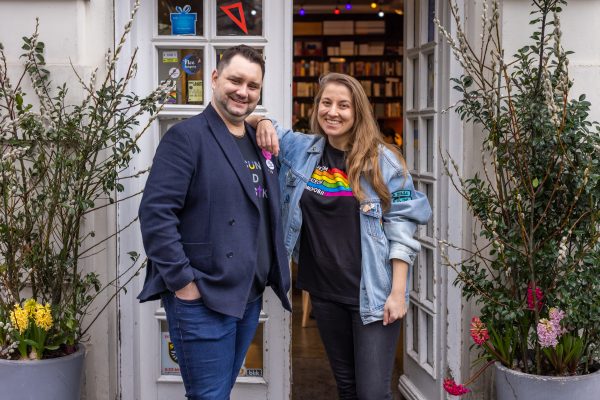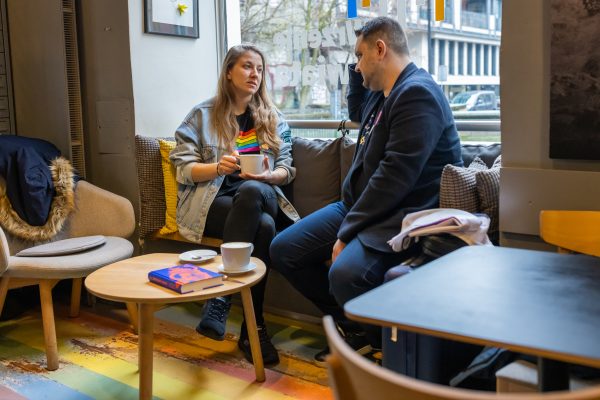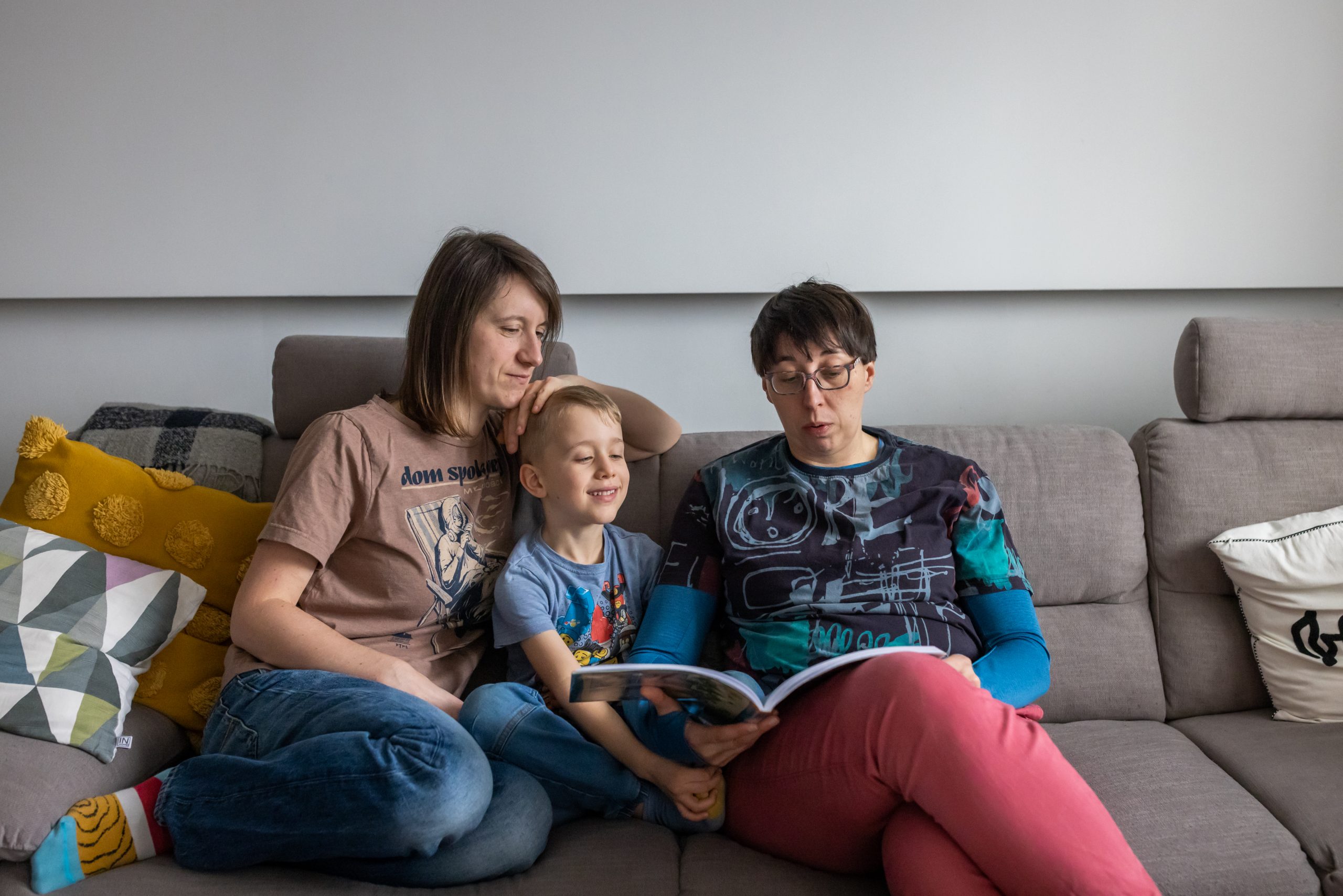
They live in Sztum, Bochnia, and Warsaw. They work, pay taxes, and bring up their children. Outside working hours, they fight for equality, to counter discrimination in government authorities, for openness in schools, and for kids like themselves not to have to constantly flee to the capital.
Surveys have shown that Poland is the least friendly place for LGBT+ people to live in the entire European Union. Below are three stories of people who are trying to change that.
Story one: Tymek’s two mothers
Karolina and Dorota have been together for twelve years. They have a flat with a mortgage, full-time jobs in large companies (Dorota is an IT specialist, Karolina is in IT support), and a son of five, Tymon. At first they lived in Kraków, then in Gdańsk, and six months ago they moved to Bochnia, a town of a population of 30 000, to be closer to family, i.e. Tymek’s grandma.
– Initially, there was a lot of concern about how we would be received here – they say – and that was because the way we envisaged it from the outset was that if we wanted to have a child, then we would not hide the nature of our family.
In the ILGA-Europe ranking, which assesses the equal standing of LGBT+ people, Poland gained a score of fifteen percent. Only seven countries in the whole of Europe had a worse rating: San Marino, Belarus, Monaco, Russia, Armenia, Turkey, and Azerbaijan. In the family category, researchers gave Poland a score of zero percent.
Just don’t tell grandma
Dorota comes from Przemyśl, and Karolina comes from Limanowa. They met in Kraków, at the Krakersy rainbow sports club.
– Dorota played volleyball. I came to get to know people – Karolina says. – I was not particularly interested in sport, but I stayed to be close to her.
– At that time, we were going through different phases – Dorota adds. – I am six years her elder, and had undergone the complete coming out process, but Karolina was only just coming to terms with it.
Karolina: – I kept it secret for a long time, out of fear. Some of my friends were churchgoers, and I was sure that our relationships would end once I told them: If you’re a lesbian, then see you around. But it turned out that most of them had nothing against it.
She came out to her family step by step. First she told her mum. – She took it well, but of course the sacred words were spoken: Just don’t tell grandma, but I am very close to my grandma; for a while I lived with her when I was a child.
For a number of years they did a balancing act: to Karolina’s mum they were a couple, and friends and room-mates to the rest of the family. When they bought their first car together, a Fiat Panda, no one was surprised. – I was still a student, and Dorota worked at a pharmacy, so everyone found the rationale to be financial hardship.
They took out a mortgage on a flat in Kraków. They thought of having a baby, and were sure that they would be open in bringing it up, with no insinuations or secrets. – I was going to go home for Christmas, so I thought that would be a good opportunity to tell grandma – Karolina says. – She took it very badly, and her main argument was what will people say? With time, we were able to repair the relationship, but I had to promise not to tell the rest of the family.
– even though that family – Dorota adds – already knew all about it anyway.
Karolina: – When I was six months pregnant, my cousin came to visit us in Kraków, and there was no way of hiding that growing belly. It turned out that they knew everything, only no one said anything, to stop grandma finding out.
It was different with Dorota: her mum and brother were supportive from the outset (her father is no longer alive). The problem arose when Karolina got pregnant. – My mum thought that people would point at our child, and that this would be harmful.
Tymek’s birth was planned down to the minutest detail. The consultations with lawyers, searching for information, and selecting the clinic – all of that took the girls two years.
They knew that Karolina would be the one giving birth. – I always wanted to have children. I remember that once I had established what orientation I was, I had a feeling of regret that I would not be a mother.
There are a number of options for conceiving a child in a rainbow family. Scenario one: the father (and sperm donor) is a male friend, usually a gay who also wants to have a baby.
Scenario two: the couple use a sperm bank; the donor is a man who consents to his details being disclosed and to be in contact with the child in the future.
Scenario three: the couple use sperm from an anonymous donor.
They rejected scenario one because there was no one in their immediate circle that they could ask to be the father. – Apart from that, we didn’t want to let a stranger into our family – Karolina says. – Even if this was a friend, friendship is not a relationship upon which to make a family.
This was also a matter of protecting Dorota. Under Polish law, only the biological parents, the mother and father, can be named on a birth certificate. – and that would mean that if something happened to me, it would not be Dorota, but the father, who would be the legal parent – Karolina explains.
Scenario two was rejected for the same reason. They came to the conclusion that a known donor is always risky, because even if he is not named on the birth certificate, he could raise claims later on the basis of genetic testing.
Ultimately, they concluded that the two of them would form a family and that was the way it should be. In Poland, insemination with donor sperm is only available to heterosexual couples, so they went to a clinic in the Czech Republic. Tymek was born in 2018. – If our relatives had any doubt up until that time, they were dispelled immediately – Karolina smiles. – At once, Tymek became the most marvellous son, grandson, and great grandson.
A parent with no rights
Kampania Przeciw Homofobii (Campaign Against Homophobia) estimates that there are 50 000 rainbow families in Poland. They consist of 150-200 000 people, children and adults – which is the population of a town of the size of Olsztyn or Rzeszów.
The founders of the Poznań foundation Tęczowe Rodziny (Rainbow Family), Jowita Wycisk and Joanna Śmiecińska, emphasise that this term covers a highly diverse range of arrangements. – This might be two people who decide to have a baby together. It might be a couple that together raise children from a previous, heterosexual relationship of one of the parents, or a couple in which both parties bring children.
Their greatest problem is that there are no laws regulating this issue. – Polish law does not make provision for registered civil unions or single-sex marriage, and therefore if a non-heterosexual couple raise a child together, only a biological parent can be a legal parent – Joanna Śmiecińska says. – The other parent will always have to produce proof that they are a parent – whether at school or at a doctor’s appointment. They live with the constant stress of not knowing if they will encounter a person who contests their status, and thereby also causes pain to the child.
If the biological parent dies, a family court rules on who gets custody over the child. It is also a court’s decision whether the child stays with the second mum or the second dad, or is given to the grandmother or other relatives. – That is an unusual situation, of course – Joanna points out. – In Poland, there are no known cases of a court taking someone’s child away after the death of a partner, but there is no rainbow family that does not think about that.
The other problem that the activists point to is openness. – We know parents who are scared to talk openly about how their family is structured. They make their children keep everything a secret, and that leads to enormous stress.
In 2021, thanks to grants under the Active Citizens Fund – National Programme, the foundation carried out the project Strefa Rodzin Tęczowych – integracja, edukacja, wzmocnienie (Rainbow Family Zone – integration, awareness, empowerment). Integration meetings were held in six different towns in Poland. During webinars with experts, parents could find out for example how to protect themselves under the law, become psychologically more resilient, or provide support for their child. – The high point was an activists’ weekend held in Karłów in Dolina Kłodzka – Jowita Wycisk says. – We wanted to create a safe space for rainbow families to get to know each other and share their experiences. In Karłów, even on the first night, the girls sat around the bonfire and started to talk about their problems and how they were managing. The truth is that we do not have a ready cure for every problem, for example whether to tell the whole truth about the family situation at school, and if so, when. To say it up front, or wait until it comes out?
– When my son was at school, I asked Jowita to hold classes on LGBT+ families – Joanna says. – and she trained the entire staff, but that was a community school, with a headteacher who was on board. If parents live in small towns where there are two primary schools, and both are governed by PiS, then they have a much greater problem with managing openness.
At the conferences they see that children in rainbow families need these meetings as well. – For many of them, it is the first time that they feel at ease to talk about their problems with peers in similar situations – Jowita says. – Some were in tears as they left Karłów.
How to demonstrate ties
Initially, Dorota and Karolina did not intend to get married. – In Poland we couldn’t get married, and a wedding in a foreign country did not give us any rights – they say.
– Dorota did not even want to change her name – Karolina adds. – At that time she felt insulted by the Polish state.
– Because in Poland – Dorota explains – you can change your name when you get married, or for a substantial reason. In the latter case, an application has to be filed with the registry office and then you have to hope that the clerk looks upon it kindly, because they can quite simply reject the application. I found it degrading, in a country in which the taxes I pay are not low, to have to beg for something that I should be entitled to.
Karolina: – and then we found the classes that Ania gives.
Anna Mazurczak, a lawyer, has been advising non-heteronormative parents for many years, and provided legal consultations under the Rainbow Family Zone project. Parents could learn how to make sure they are safe in a country in which they do not have the status of parents. They learned that it is advisable to document their life together, in the form of bills, trips, or holiday photos, to demonstrate the ties with the child. While indeed a biological parent cannot share custody with the other social parent, they can delegate the power to perform certain actions such as picking up a child from kindergarten.
Karolina: – We discovered at the classes that we have to use all of the means available under Polish and EU law to prove that we are a family, and that there are true ties between myself, Dorota, and Tymek.
They got married in Berlin, and shortly after that Dorota added Karolina’s surname to her own. She submitted an application to a registry office known to be sympathetic to LGBT people. Information about the office to which it was best to apply was shared among rainbow parents on the grapevine. – Now it is easier. When people see that we have the same surname as Tymek, they immediately make the connection, that I am a relative, his mum, aunt, or sister.
Even so, many situations are stressful for her, for example when Karolina travels on business, and she stays with Tymek by herself. – In those cases, I think to myself, what if something happens to him and we have to go to hospital? Supposedly all the relevant powers have been delegated to me, but I am not taking them on a walk to the park.
The other mum
Usually, Dorota takes Tymek to kindergarten, because Karolina starts work at seven o’clock in the morning. Karolina picks him up in the afternoon, because Dorota works until five o’clock in the afternoon and the kindergarten closes half an hour before that.
– But recently Karolina had to go away for a week, and I picked up Tymek – Dorota recalls. – and I heard another boy ask him: so who is that, and Tymek explained that it was his mum, his other mum, because one was away. Later on I asked him at home whether the children ask him that a lot. He made a dismissive hand gesture to show that they ask him and he finds it tiresome.
Karolina: – We knew from the outset that if we wanted to have a child, we would have to give him support and assure him that we are a family like any other. When we were looking for a kindergarten, I would say every time at the end of the conversation: Our situation is unusual because Tymek has two mums. This was to avoid situations in which he tells his peers that, and the lady explains to him that it cannot be possible.
Dorota: – Our view is that a child at that age should not take on the role of making the world realise what kind of family we are, and that we should deal with all of the negative reactions ourselves.
Until now, they have lived in large towns, where it is easy to remain anonymous. In Kraków, they knew a few people on their residential estate and parents from the crèche; Gdańsk, where they moved for the three years of the pandemic, has always been considered an open-minded city. – Opposite us lived a retired couple in their sixties. We were worried that they would exorcise us using holy water, but we became friends and are still in touch today – Karolina laughs.
At first they were worried about Bochnia: a small town in which everyone knows everyone’s business, and conservative (PiS got the most votes in the last election).
– Nothing unpleasant has happened to us for the time being – they say. – When we enrolled Tymek in kindergarten, the head teacher said that that it was a public facility, and every child was entitled to a place, and every child would be given support there.
Dorota: – Tymek loves going there. He adapted instantly.
Karolina: – Of course we have to consider what comes next. There is always a chance that some child will come up to Tymek at school and say that he has a weird family, and that is why we wanted him to get to know other rainbow families, so that he can respond that we are not weird at all, and that there are many families like ours.
Story two: Julia breaks new ground in Koszalin
Julia Maciocha was 23 years old when she organised the Warsaw gay pride march for the first time. The average age of the other volunteers was no more than twenty-one. – We were the youngest team in Europe. They called us a group of kids, and it was up to us to organise a march of 40 000 people in the capital – she says. – and we decided upon the worst possible route.
The nationalists blocked the way for the march in a narrow street adjacent to Hala Koszyka. They chained themselves to traffic signs and set fire to tyres. The march participants had nowhere to retreat to, and the police refused to help. – I was wearing a dress sewn from two hundred metres of train and a flower headdress, and carried a wand. I was dressed this way when I went to up police who pretended not to see the problem, and started yelling that I was the organiser and as such I demanded that they deal with the obstacle that those guys were causing, and that this was my constitutional right, and article 20 of the Criminal Code.
The police moved the nationalists off the road, and the march continued. That was in 2017. Since then, Julia and her team have organised the gay pride march six times, and the last one was attended by 80 000 people.
– That is eight, or sometimes ten months’ work. Julia gives a list – deciding on a date that does not conflict with other events, agreeing the route in consultation with the city authorities; drawing up the demands, hiring cars, placing portable toilets and tents in the village, applying for grants, and inviting guests, businesses, and organisations, – and a great deal of stress. After every gay pride march I cry, and those tears are not tears of joy, but relief that once again we succeeded in leading people through Warsaw safely. I think about a shooting that took place in Oslo two years ago before a march, and when someone forced their way on to the stage during the finale of the Wielka Orkiestra Świątecznej Pomocy (Great Orchestra of Christmas Charity) in Gdańsk and attacked Paweł Adamowicz with a knife. In Olsztyn, a girl was shot with an air rifle after the gay pride march, and in Lublin we had a home-made bomb. In Warsaw in 2018, some guy attacked a fourteen-year-old girl at a bus stop and told her to wipe the rainbow from her cheek.
According to Campaign Against Homophobia research, more than half (53 percent) of LGBT+ people have experienced hate crimes based on sexual orientation or gender identity. One in four LGBT+ people feel that they have to conceal their identity in the workplace. 44 percent of respondents reported serious indications of depression (among transgender people more than 60 percent), and more than half (55 percent) acknowledged that at times they have suicidal thoughts.
– For many, the gay pride march is a safe space where they can be themselves, sometimes for the first time in their life – Julia says. – For me, above all, it is an inviting place, of the kind that I myself needed when I was twelve years old and began to suspect that there was something wrong with me.
Marching cities
She grew up in Koszalin. Her father ceased to be part of the family’s life at an early stage, and her mum was working multiple jobs to keep three daughters. – From early childhood, I felt that I didn’t fit in. The local girls I used to play with wanted to be actors and singers, while when I was eight I dreamed of saving whales on a large Greenpeace ship.
She first started voluntary work at the age of twelve: tutoring underprivileged children at the local community centre. Next, she became of the youngest people in Poland to be a Szlachetna Paczka (Noble Gift) coordinator, and a member of the Youth Council, and to be a joint organiser of the local Women’s Congress. – I came out quickly, when I was fourteen, and my mum and sisters accepted me immediately. Apart from one teacher who stopped talking to me, I did not have any unpleasant experiences. The greatest problem was my own activism: everyone kept asking me what I was doing that for, if I wasn’t making any money.
Koszalin at that time and Koszalin today are two different worlds, Julia says. The Koszalin of that time appeared to be an ugly, dull city that livened up for two months, when the tourists came in the holiday season. Apart from the city’s two cinemas, there was not much going on. – You knew every gay and lesbian in the town, but there was no such thing as the LGBT community – she says.
Once she had taken her matriculation examination, she fled to Warsaw. She studied breeding and preservation of wild animals at the Warsaw University of Life Sciences (SGGW), and in between classes she would race to do her voluntary work. She worked on the helpline for abused women at Feminoteka, and then opened a nationwide abuse prevention network. – It was then that I realised for the first time how important regions are – she says. – The reason for Owsiak’s success is that kids walk around with collection boxes throughout the entire country, and why is the abortion question so widely accepted? Because thousands of girls protested in the streets all over the country. If something happens only in Warsaw, it will never be as effective.
Working with Piotr Moszczeński, she devised the Koalicja Miast Maszerujących (Coalition of Cities on the March), to bring together organisers of marches from all over Poland. At the congress held three years ago in Łódż, 27 representatives of groups from various towns signed a declaration of cooperation. Under the Kongres Miast Maszerujących Po Równość Osób LGBT+ (Congress of Cities on the March to Equality for LGBT+ People) funded from the Active Citizens Fund – National Programme, it was possible to hold a series of meetings for activists to get to know each other and share know-how. If someone wanted to hold a march in their own town, they would have the know-how ready from other organisations, and would not have to devise everything from scratch, Julia explains. – We advise on fund-raising and how to come to arrangements with the local government authority and police. For example, we got a call saying that in one town the police had said that minors would not be allowed to take part in a march. We have a legal opinion that says that this is a breach of the constitution. Attempts were made in some towns to ban marches, and we went to court.
Last year, there were marches in 37 towns all over Poland. – If all of the kids keep fleeing to the capital the way I did, nothing will change – Julia believes. – Warsaw will be a nice and a safe place, but we will always return home on festive occasions and pretend that our partner is just a girlfriend from university.
Under the project, Julia went to Iceland with a group of activists, where they met with organisers of Reykjavik Pride, and the city authorities, but the most difficult discussions were those with Polish expatriates living there. – We got to know people who had fled Poland due to abuse from family and peers. We tried to present a slightly different picture of Poland, and show that it is changing as well.
A few years ago, Julia was invited to lead the first gay pride march in Koszalin. – I thought to myself: there is no way I am going back there, but I went, and it turned out that a lot of people attended. I led that march along the streets that I remembered from the days when I was at upper secondary school, and recounted: this is where I kissed a girl for the first time, or this is where I had my first date. That was liberating, as if I had cast off a burden.
Story three: Marta marches into politics
The smallest gay pride march took place in Sztum, a town of just under 10 000. Marta Zarańska was one of the organisers. Marta is a lawyer, government clerk, and ally of LGBT people, In her personal life – mum to Ela, who is two years old. – I got a call from a girlfriend with whom I organised the Strajk Kobiet (All-Poland Women’s Strike), and she said to me we’re having a march. I was horrified at the thought. I was worried that it would be a washout, that maybe around ten people would turn up.
She grew up in Sztum, in a family of teachers. Her dad was a PE instructor, and her mum was a teacher at a school for people with disabilities. Marta jokes that she has been an activist since birth because her parents took her to all of the Special Olympics championships.
During the holiday season, she would work as a beach lifeguard. She says that in small towns, lifeguards are a kind of confidant to whom anyone can come with their problems. – I remember one girl who told me that she was a lesbian, and that for that reason her grandma had threatened to commit suicide. I tried to be supportive, but I see today that I had no means of doing so.
In a small town, Marta says, the psychological toll of coming out is much higher. – In Gdańsk you can live as a lesbian openly, and on the other side of town, your grandma will have no idea. Here, everyone knows each other. Anything you will affect your whole family.
Four years ago, the local government authority in Sztum was the first in Pomorze to adopt the Local Government Charter of the Rights of the Family produced by Ordo Iuris, known as the anti-LGBT resolution. The signatures were collected by the local parish. At that time, Marta was studying in Olsztyn. – I remember being terribly ashamed, and a feeling of disbelief. Six months later there was a change of power in the local government authority and the charter was annulled. – But before that there was the presidential election campaign and the words spoken by Andrzej Duda, that LGBT is not people, it is an ideology. It was then that I realised where we had got to – Marta says. – That words like that can be spoken in public discourse by an important politician, for political ends, and I could not stand by and do nothing.
Breakfast with the mayor
In 2018, Gdańsk was the first city in Poland to adopt a resolution to protect residents against discrimination on grounds of gender, origin, religion, disability, age, or sexual orientation. The Model for Equal Treatment contains 179 different recommendations to provide support for and protect sexual and other minorities. – That taught us what is involved in working with government officials and local politicians. We were entering uncharted territory, because no one had ever done this before in Poland – says Piotr Jankowski of the Tolerado LGBT Association, which played a part in work on the project.
Piotr says that in Poland, for thirty years, all of the work in aid of equality has been done by CSOs. Even if they have budgets of millions, which is extremely rare, these CSOs are still small organisations with limited capabilities. – The state, on the other hand, with all of its levels, has an entire system, and we want to enter that system and reform it.
In 2021, they organised the project Local Leaders and the Drive behind Social Change, thanks to grants under the Active Citizens Fund – National Programme. They invited fourteen activists from small towns, because those are the places – Piotr says – where there are frequently homophobic attacks on action in aid of equality: in Lębork there was an attempt to pass a resolution declaring the city free of LGBT and gender ideology, and in Kościerzyna a banner paid for by a local politician comparing homosexuality with zoophilia hung for two years. – and we had the know-how to exert an influence on local government authorities, and could share that know-how. For example every local district, municipal, and voivodship authority is required to generate strategy documents, and they often state that the authority in question will create conditions conducive to diversity or support the local community. These is crucial wording that can be cited in discussions with politicians and officials.
Under the project, training was also given to people at the City Hall in Gdańsk and four authorities subordinate to it, including the Registry Office and Municipal Family Welfare Centre. – The first training course concerned equality and various groups’ experiences of discrimination. It was also about the movement itself and its history, because often people say that the whole LGBT+ thing must have come from somewhere, while in truth gender transition predates the polio vaccine – Piotr says. – There was also training on more specialised subjects, for example a meeting between people working at the Gdańsk Children’s and Young People Psychological Welfare Centre and a sexologist specialising in transgender issues. Together, we produced the Municipal Service Standards, which include LGBT+ people’s needs.
They also went to Oslo to a meeting with activists of the oldest gay rights organisation in Norway, the Norwegian Organisation for Sexual and Gender Diversity – FRI – Foreningen for kjønns – og seksualitetsmangfold. – The people who founded it have now retired. They told us of how they began their activity, and we were able to compare that with where we are.
They were guests at an official breakfast at the town hall hosted by the Oslo Mayor Marianne Borgen. – We came into contact with a different political world – Piotr smiles. – We are sitting, as queer people in an office with a view over the fiord, surrounded by Munch originals, with tea and biscuits, and listening to the mayor tell us with pride that Oslo has been observing an equality policy for years.
Pink top
Marta Zarańska did not go to Oslo because she had given birth to her daughter two months before; the joined the meetings online. She says that first of all the project provided information on how to exert influence on local government, build leadership, and operate in an institutional manner.
Secondly, she learned how to deal with hate and burnout. – One time I was handing out flyers in the park, and had my daughter with me because as it happened I didn’t have anyone to leave her with. It was a beautiful, sunny day, and I was soon approached by an elderly man who said that the best thing would be for us to hang – Marta says. – What was my reply? There was no reply, I know now that I don’t enter into discourse if there is no sphere in which I can do so.
Thirdly, it changed my attitude towards politics. – In Poland, politics is still considered something unsavoury, and people say: we don’t discuss politics at the table, because we know that an argument will break out. The project made me realise that politics also means agency, and that if I disapprove of something I can try to change it.
In the last election, she ran for parliament for Lewica. She did not get elected, but the Minister for Equality, Katarzyna Kotula, offered her a job as director of her constituency office. As we are talking, Marta is in fact looking for the right premises in Gdańsk; it has to be on the ground floor so that persons with disabilities do not have difficulty with access.
With regard to the gay pride march, she says, there were five people on the organising committee; as the lawyer, she took on the formalities, i.e. the application to hold the march. – There was a problem, because the chief of police said we could not use a voivodship road. Tolerado came to our aid; Piotrek gave me a tip on the act of law to cite, and the march was permitted.
The march was held on 26 August. It was attended by the Danish ambassador and a representative of the British embassy; there was a float, drag queens, and a lot of residents.
Marta: – Later a friend told me that when he had been in secondary school he had been beaten up for having a pink top, and that he would never have expected that fifteen years later there would a gay pride march in our town of Sztum and that people would wave at us from their windows.
The projects Strefa Rodzin Tęczowych – integracja, edukacja, wzmocnienie (Rainbow Family Zone – integration, awareness, empowerment) Fundacji Tęczowe Rodziny (Rainbow Family Foundation), Kongres Miast Maszerujących Po Równość Osób LGBT+ (Congress of Cities on the March to Equality for LGBT+ People), Fundacji Wolontariat Równości (Volunteers of Equality Foundation) Lokalni liderzy i liderki motorem zmiany społecznej (Local Leaders and the Drive behind Social Change), and Stowarzyszenie na Rzecz Osób LGBT Tolerado (Tolerado LGBT Association) were carried out using grants under the Active Citizens Fund – National Programme funded by Iceland, Liechtenstein and Norway using EEA funds
Text: Katarzyna Brejwo
Photo: Anna Liminowicz
The report was published on Nesweek.pl and Onet.pl
